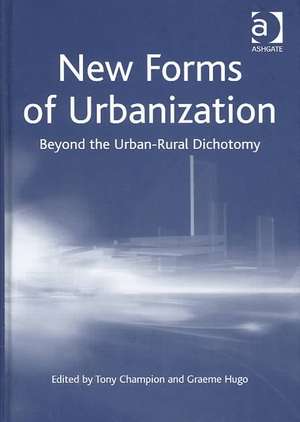New Forms of Urbanization: Beyond the Urban-Rural Dichotomy
Autor Graeme Hugo Editat de Tony Championen Limba Engleză Hardback – 28 noi 2003
| Toate formatele și edițiile | Preț | Express |
|---|---|---|
| Paperback (1) | 388.97 lei 22-36 zile | +30.70 lei 5-11 zile |
| Taylor & Francis Ltd. – 11 noi 2016 | 388.97 lei 22-36 zile | +30.70 lei 5-11 zile |
| Hardback (1) | 741.53 lei 43-57 zile | |
| Taylor & Francis – 28 noi 2003 | 741.53 lei 43-57 zile |
Preț: 741.53 lei
Preț vechi: 992.75 lei
-25% Nou
Puncte Express: 1112
Preț estimativ în valută:
141.91€ • 147.25$ • 118.61£
141.91€ • 147.25$ • 118.61£
Carte tipărită la comandă
Livrare economică 17-31 martie
Preluare comenzi: 021 569.72.76
Specificații
ISBN-13: 9780754635888
ISBN-10: 0754635880
Pagini: 448
Ilustrații: Includes 18 b&w illustrations
Dimensiuni: 152 x 229 x 34 mm
Greutate: 0.74 kg
Ediția:New ed
Editura: Taylor & Francis
Colecția Routledge
Locul publicării:Oxford, United Kingdom
ISBN-10: 0754635880
Pagini: 448
Ilustrații: Includes 18 b&w illustrations
Dimensiuni: 152 x 229 x 34 mm
Greutate: 0.74 kg
Ediția:New ed
Editura: Taylor & Francis
Colecția Routledge
Locul publicării:Oxford, United Kingdom
Cuprins
Contents: Part I: Introduction: Introduction: moving beyond the urban-rural dichotomy, Tony Champion and Graeme Hugo; Lest we re-invent the wheel: lessons from previous experience, Tony Champion; World urbanization: trends and prospects, Hania Zlotnik. Part II: Regional Perspectives on Settlement Change: The fading of city-suburb and metro-nonmetro distinctions in the United States, William H. Frey; Population dynamics and urbanization in Latin America: concepts and data limitations, Alfredo E. Lattes, Jorge RodrÃguez and Miguel Villa; Urbanization trends in Asia: the conceptual and definitional challenges, Gavin W. Jones; Analyzing urbanization in Sub-Saharan Africa, Philippe Bocquier. Part III: Case Studies: The transformation of the urban system in Mexico, Gustavo Garza; Urban development and population redistribution in Delhi: implications for categorizing population, Véronique Dupont; Urbanization and metropolitanization in Brazil: trends and methodological challenges, José Marcos Pinto da Cunha; Changing urbanization processes and In Situ rural-urban transformation: reflections on China's settlement definitions, Yu Zhu. Part IV: Conceptualizing Settlement Systems: An evolutionary approach to settlement systems, Denise Pumain; The conceptualization and analysis of urban systems: a North American perspective, Larry S. Bourne and Jim Simmons; The nature of rurality in postindustrial society, David L. Brown and John B. Cromartie; Rethinking 'Rurality', Keith Halfacree. Part V: Moving From The Conceptual To The Operational: Multiple dimensions of settlement systems: coping with complexity, Mike Coombes; Using remote sensing and geographic information systems to identify the underlying properties of urban environments, John R. Weeks; Reflections on the review of metropolitan area standards in the United States, 1990 - 2000, James D. Fitzsimmons and Michael R. Ratcliffe. Part VI: The Way Forward: Conclusions and recommendations, Graeme Hugo and Tony Champion; Bibliography; Index.
Notă biografică
Tony Champion is Professor of Population Geography at the University of Newcastle upon Tyne, UK. Graeme Hugo is Professor of Geography and Director of National Key Centre in Social Applications of Geographical Information Systems at the University of Adelaide, Australia.
Recenzii
'This book is a milestone in our understanding of the way cities are developing as we head towards a post-industrial, global world. Everyone interested in what our cities will look like in the 21st century should read this book.' Professor Michael Batty, University College London, UK 'The book is indeed a valuable contribution towards conceptualising the rapid rural-urban transformation in the developing countries. The case studies from Mexico, India and China makes the book a useful tool in understanding the emerging diversity of urban forms important for urban and metropolitan planning. The book is innovative in setting the agenda for new classification of settlements relevant for human lives in the rapidly changing world.' Ram B. Bhagat, Tata Institute of Social Sciences, India 'By 2020 the world will for the first time have more than 50 per cent of its population living in urban places. This will involve a huge increase of urban population. This book provides a major review of these processes of urban change. The authors are among some of the leading researchers and practitioners in this field and ensure that this book will be a seminal contribution to the study of urbanization.' Professor Terence McGee, University of British Columbia, Canada 'A deft handling of ongoing discussions about statistical methodology for measuring the populations and demographic characteristics of cities, New Forms of Urbanization tackles the issues of comparability, areal units, methods of aggregation, and measures of urban and rural in standards for the presentation of urban statistics. New Forms of Urbanization does so ably by bringing in perspectives from all over the world. This book should help address the global disparities in data, paving the way to greater efforts to streamline and coordinate approaches.' David R. Rain, US Census Bureau, Washington DC, USA 'This book should be of major interest to scholars, students and government officials interested in urban plan
Descriere
This book brings together a leading team of social scientists to present the latest information on urbanization around the world, highlighting examples of development patterns that are not adequately captured by the UN's type of reporting systems and drawing attention to other ways of representing current trends.
